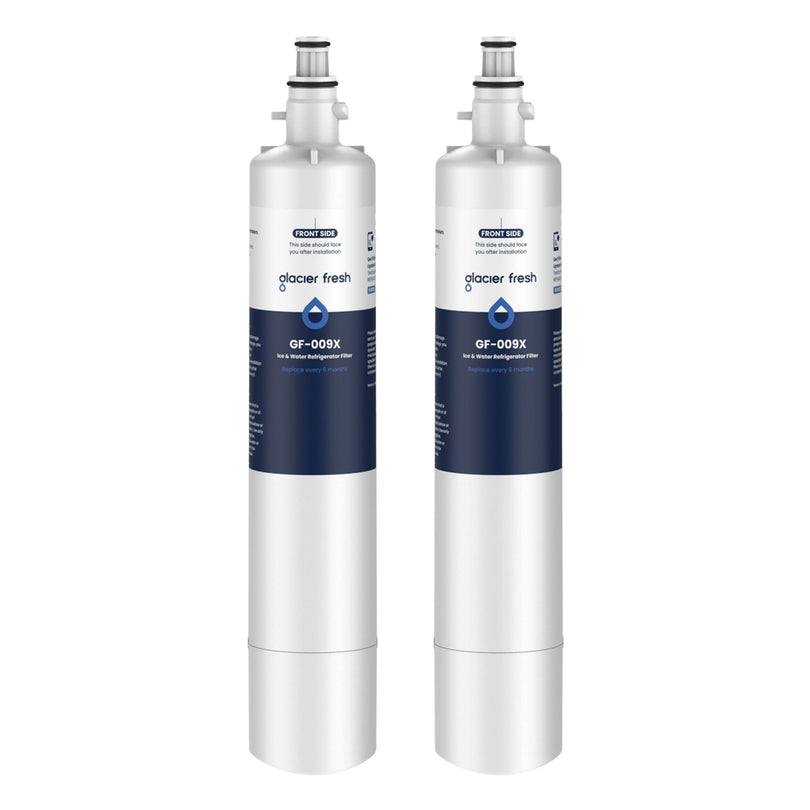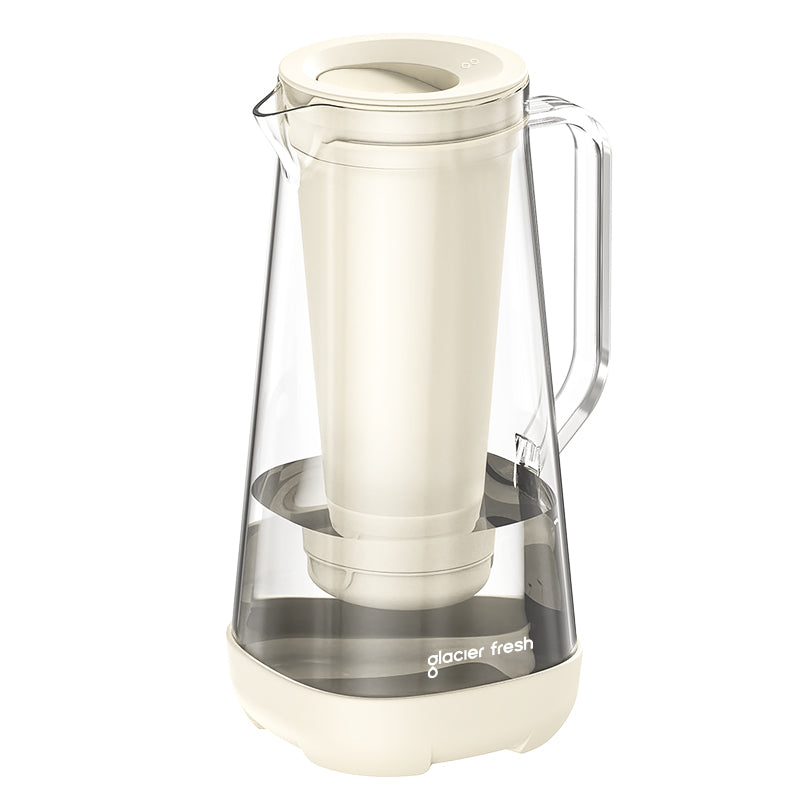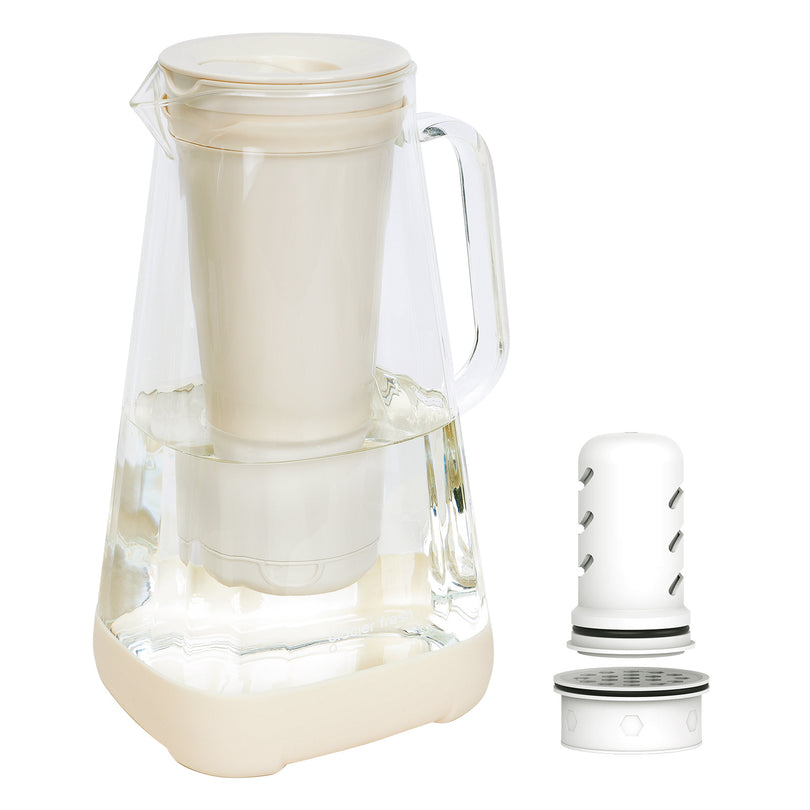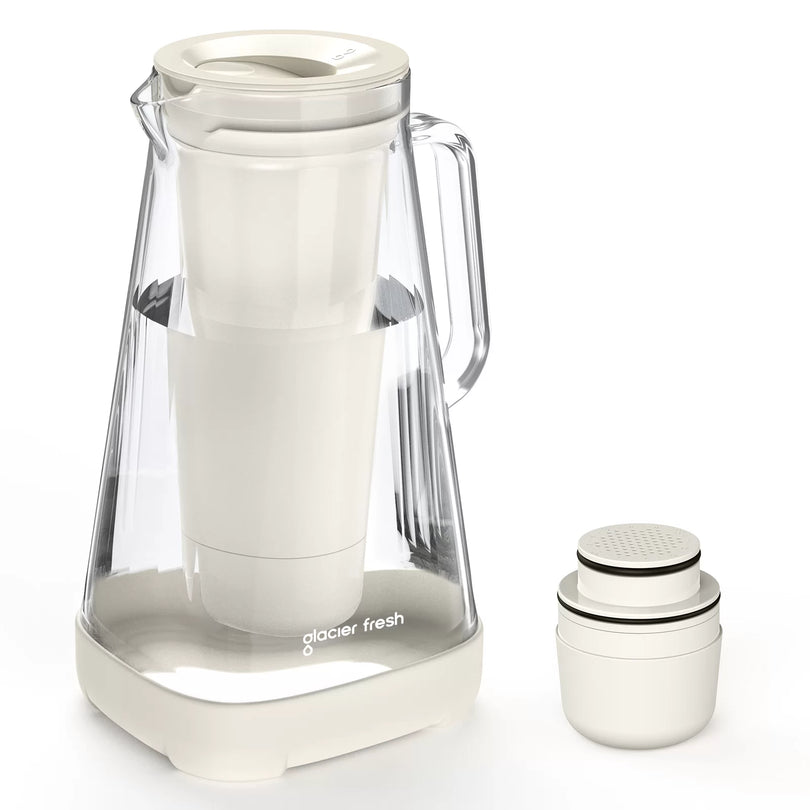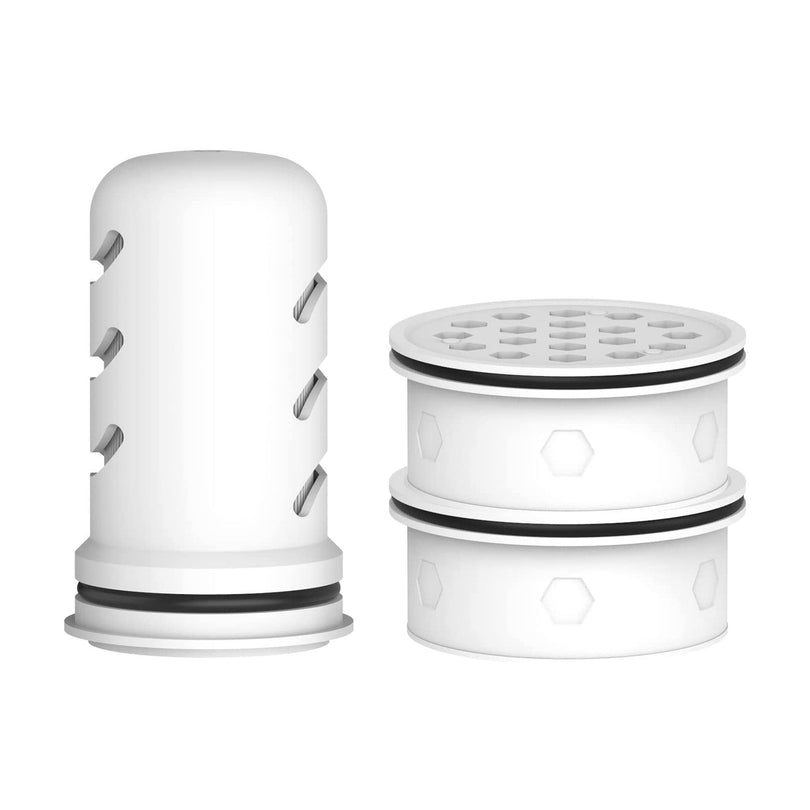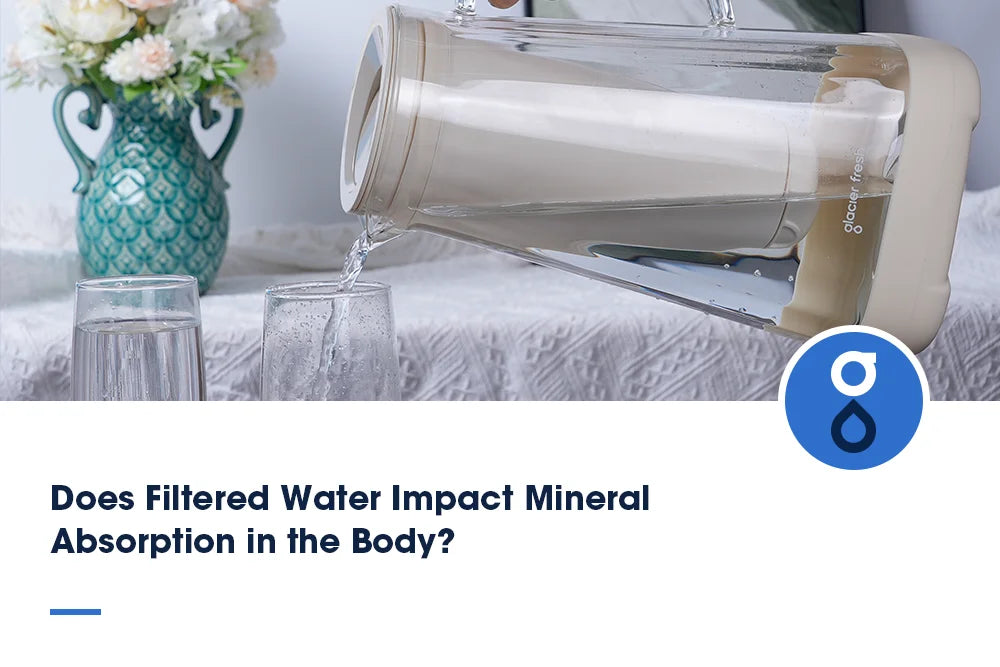Table of Contents:
Mineralstoffaufnahme verstehen
Der Einfluss von gefiltertem Wasser auf den Mineralgehalt
Wie wirkt sich gefiltertes Wasser auf die Aufnahme von Mineralien im Körper aus?
Sollten Sie sich über gefiltertes Wasser und die Mineralaufnahme Gedanken machen?
Empfehlungen zur Mineralstoffaufnahme im Körper
FAQs
Abschluss
Wasser ist lebensnotwendig, und ausreichend Flüssigkeit ist entscheidend für die Gesundheit. Da die Menschen jedoch gesundheitsbewusster werden, greifen viele zu gefiltertem Wasser, um saubereres, reineres Wasser zu trinken. Allerdings stellt sich oft die Frage: Beeinträchtigt das Trinken von gefiltertem Wasser die Mineralstoffaufnahme im Körper? Werden durch den Filterprozess wichtige Mineralien entfernt, und könnte dies die allgemeine Gesundheit beeinträchtigen?
In diesem Blog untersuchen wir, wie sich gefiltertes Wasser auf die Mineralstoffaufnahme auswirkt, ob bestimmte Arten von Wasserfiltersystemen ein Gesundheitsrisiko darstellen und was Sie tun können, um eine ausgewogene Mineralstoffaufnahme über Ihr Wasser und Ihre Ernährung aufrechtzuerhalten.
Mineralstoffaufnahme verstehen

Mineralien wie Kalzium, Magnesium, Kalium und Zink sind für die Körperfunktionen lebenswichtig. Diese Mineralien unterstützen eine Reihe von Körperfunktionen – von der Knochengesundheit über die Nervenübertragung bis hin zur Muskelkontraktion.
Mineralstoffe werden hauptsächlich im Dünndarm aufgenommen, wo sie die Darmwände passieren und in den Blutkreislauf gelangen, wo sie an Zellen und Gewebe verteilt werden. Die Flüssigkeitszufuhr spielt eine wichtige Rolle für die Effizienz dieses Prozesses, da eine ausreichende Wasseraufnahme zur optimalen Funktion des Verdauungssystems beiträgt und den Nährstofftransport unterstützt.
Der Einfluss von gefiltertem Wasser auf den Mineralgehalt
Sie denken vielleicht, dass gefiltertes Wasser die gesündere Wahl ist, und Sie haben Recht. Gefiltertes Wasser bietet mehrere Vorteile. Zunächst einmal entfernen Wasseraufbereitungsmethoden schädliche Verunreinigungen und sorgen so für sichereres Wasser für Ihre Trinkstrategien.
Es gibt jedoch einen Haken. Diese Reinigungsprozesse können auch den Mineralgehalt senken. Eine Analyse des Mineralgehalts von gefiltertem Wasser kann einen reduzierten Gehalt an lebenswichtigen Mineralien wie Kalzium, Magnesium usw. zeigen. und Kalium. Diese Mineralien, die für verschiedene Körperfunktionen unerlässlich sind, kommen natürlicherweise in ungefiltertem Wasser vor.
Welche gesundheitlichen Folgen hat das? Wenn Sie sich ausschließlich auf gefiltertes Wasser verlassen, kann ein Mineralstoffmangel auftreten, insbesondere wenn Ihre Ernährung diese Mineralien nicht ergänzt. Aber keine Panik! Das bedeutet nicht, dass Sie auf gefiltertes Wasser verzichten sollten. Der Mineralstoffverlust ist minimal und eine ausgewogene Ernährung sollte den Unterschied problemlos ausgleichen.
Wie wirkt sich gefiltertes Wasser auf die Aufnahme von Mineralien im Körper aus?
Sie fragen sich vielleicht, welchen Einfluss gefiltertes Wasser auf die Aufnahme wichtiger Mineralien in Ihrem Körper hat. Verschiedene Wasserfiltermethoden, wie z. B. Glasfilterkrüge, können die Bioverfügbarkeit von Mineralien in Ihrem Körper beeinflussen. Während einige Methoden die Konzentration von Spurenelementen im Wasser reduzieren, bleiben diese Mineralien bei anderen erhalten.

Eine ausreichende Flüssigkeitszufuhr ist entscheidend für die Aufnahme und Verwertung von Mineralien aus der Nahrung. Das Wasser, das Sie trinken, ist jedoch nicht die Hauptmineralquelle für Ihren Körper. Die meisten essentiellen Mineralien werden über die Nahrung aufgenommen.
Sollten Sie sich über gefiltertes Wasser und die Aufnahme von Mineralien Gedanken machen?
Gefiltertes Wasser entfernt Verunreinigungen, aber auch einige Mineralstoffe wie Kalzium und Magnesium. Die Auswirkungen auf Ihren Mineralstoffhaushalt sind jedoch weniger schwerwiegend, als Sie vielleicht denken.
Die meisten Mineralstoffe stammen aus der Nahrung, nicht aus dem Wasser, das Sie trinken. Eine ausgewogene Ernährung mit viel Vollwertkost liefert Ihrem Körper die notwendigen Mineralstoffe. Um den gleichen Mineralstoffgehalt in der Nahrung zu erhalten, müssten Sie eine enorme Menge Wasser trinken.
Dennoch ist es verständlich, sich über die Auswirkungen der Wasseraufbereitung Sorgen zu machen, insbesondere wenn gefiltertes Wasser eine Ihrer wichtigsten Flüssigkeitsquellen ist. In diesem Fall sollten Sie Ihrem gefilterten Wasser Mineraltropfen hinzufügen oder in einen Filter investieren, der Mineralien wieder einführt.
Aber denken Sie daran: Dies ist kein Ersatz für eine gesunde Ernährung. Kurz gesagt: Gefiltertes Wasser beeinträchtigt zwar die Mineralstoffaufnahme bis zu einem gewissen Grad, aber es reicht nicht aus, um Ihren Mineralstoffhaushalt erheblich zu stören. Genießen Sie also weiterhin Ihr gefiltertes Wasser, aber vergessen Sie nicht, auch Gemüse zu essen!
Empfehlungen zur Mineralstoffaufnahme im Körper

Genießen Sie gefiltertes Wasser und eine gesunde Ernährung und achten Sie auf bewährte Methoden zur Verbesserung der Mineralstoffaufnahme. Der Schlüssel liegt in der Aufrechterhaltung eines ausgewogenen Nährstoffhaushalts durch die Einhaltung von Ernährungsrichtlinien und Flüssigkeitszufuhrstrategien.
Eine gute Faustregel ist, auf eine Mischung verschiedener Mineralstoffquellen zu achten. Dies trägt zur Optimierung der Aufnahmefaktoren bei. Beispielsweise kann der Verzehr von Vitamin C und Vitamin D sowie eisenreicher Lebensmittel die Eisenaufnahme steigern.

Denken Sie daran, dass eine ausreichende Flüssigkeitszufuhr die allgemeine Gesundheit fördert und die Nährstoffaufnahme unterstützt. Gefiltertes Wasser, frei von Verunreinigungen, ist eine hervorragende Flüssigkeitszufuhr. Wenn Sie jedoch Angst vor Mineralstoffverlust haben, können Sie Ihre Ernährung jederzeit mit mineralstoffreichen Lebensmitteln ergänzen oder Ihrem gefilterten Wasser Mineralstofftropfen hinzufügen.
FAQs
Kann Umkehrosmosewasser meinem Körper wichtige Mineralien entziehen?
Zwar werden durch die Umkehrosmose einige Mineralien aus dem Wasser entfernt, doch ist es unwahrscheinlich, dass sich dies negativ auf Ihre Gesamtmineralstoffaufnahme auswirkt. Wenn Sie für Ihre Mineralstoffaufnahme stark auf Wasser angewiesen sind oder eine eingeschränkte Ernährung einhalten, ist es wichtig, die Wasserqualität zu berücksichtigen und die Ernährung entsprechend anzupassen.
Ist es für die Mineralstoffaufnahme besser, Mineralwasser oder gefiltertes Wasser zu trinken?
Die Wahl zwischen beiden kann schwierig sein. Es ist wichtig, sowohl Ihre Geschmacksvorlieben als auch Ihre gesundheitlichen Bedürfnisse zu berücksichtigen. Gefiltertes Wasser bietet einen klaren, erfrischenden Geschmack und ist die beste Wahl, wenn Sie sich Sorgen über mögliche Verunreinigungen in Ihrem Trinkwasser machen. Mineralwasser ist eine natürliche Quelle wichtiger Mineralien und könnte für Sie geeignet sein, wenn Sie Wert auf einzigartigen Geschmack und einen Mineralstoffschub legen.
Wie kann ich genügend Mineralien zu mir nehmen, wenn ich gefiltertes Wasser trinke?
Der Schlüssel liegt in der Qualität Ihrer Ernährung und Ihres Lebensstils. Durch die Integration mineralstoffreicher Lebensmittel, Nahrungsergänzungsmittel und Absorptionsverstärker in Ihren Alltag stellen Sie sicher, dass Ihr Körper die Mineralien erhält, die er benötigt.
Abschluss
Zusammenfassend lässt sich sagen, dass gefiltertes Wasser, insbesondere aus Umkehrosmoseanlagen , den Mineralstoffgehalt des Wassers reduzieren kann. Es ist jedoch unwahrscheinlich, dass es Ihre Mineralstoffaufnahme oder Ihre allgemeine Gesundheit wesentlich beeinträchtigt. Der Großteil Ihrer Mineralstoffaufnahme stammt aus der Nahrung. Solange Sie sich ausgewogen ernähren, sollte das Trinken von gefiltertem Wasser Ihre Mineralstoffaufnahme nicht negativ beeinflussen. Achten Sie auf eine ausreichende Flüssigkeitszufuhr, ernähren Sie sich mineralstoffreich und unterstützen Sie die Gesundheit und das Gleichgewicht Ihres Körpers. Folgen Sie Glacier Fresh, um weitere Wasserfilterlösungen zu finden.




